Photo credits – Matt Meduri
In an effort to combat the rising epidemic of human trafficking, as well as bolster public safety and health and welfare of children and adolescents, a task force has been assembled and held their first meeting at Stony Brook University on Tuesday afternoon.
Spearheaded by Assemblyman Brian Maher (R-Walden), Assemblyman Ed Flood (R-Port Jefferson Station), and Assemblywoman Jodi Giglio (R-Baiting Hollow), the panel featured other elected officials and local leaders, such as Assemblyman Joe DeStefano (R-Medford), Assemblyman Mike Durso (R-Massapequa Park), and Suffolk County Legislator Chad Lennon (C-Rocky Point). Representatives for Suffolk County District Attorney Ray Tierney (R) and Suffolk County Legislator Trish Bergin (R-East Islip) were also present.
The task force compiled professionals from law enforcement, school districts, and nonprofits, as well as a slew of social workers and lawyers. The panel split into four groups, with an even distribution of professionals from each professional field, to discuss certain issues and initiatives and offer unique perspectives to each. The task force concluded with a roundtable discussion of the findings.
The first group discussed how New York can strengthen support for survivors and communities. The second group discussed the coordination and tools that law enforcement and prosecutors need to better combat traffickers and help victims. The third group discussed the impacts the migrant crisis is having on human trafficking crimes within the state. The fourth group discussed the kinds of education and training needed to better equip professionals and all New Yorkers to recognize the signs that someone needs help.
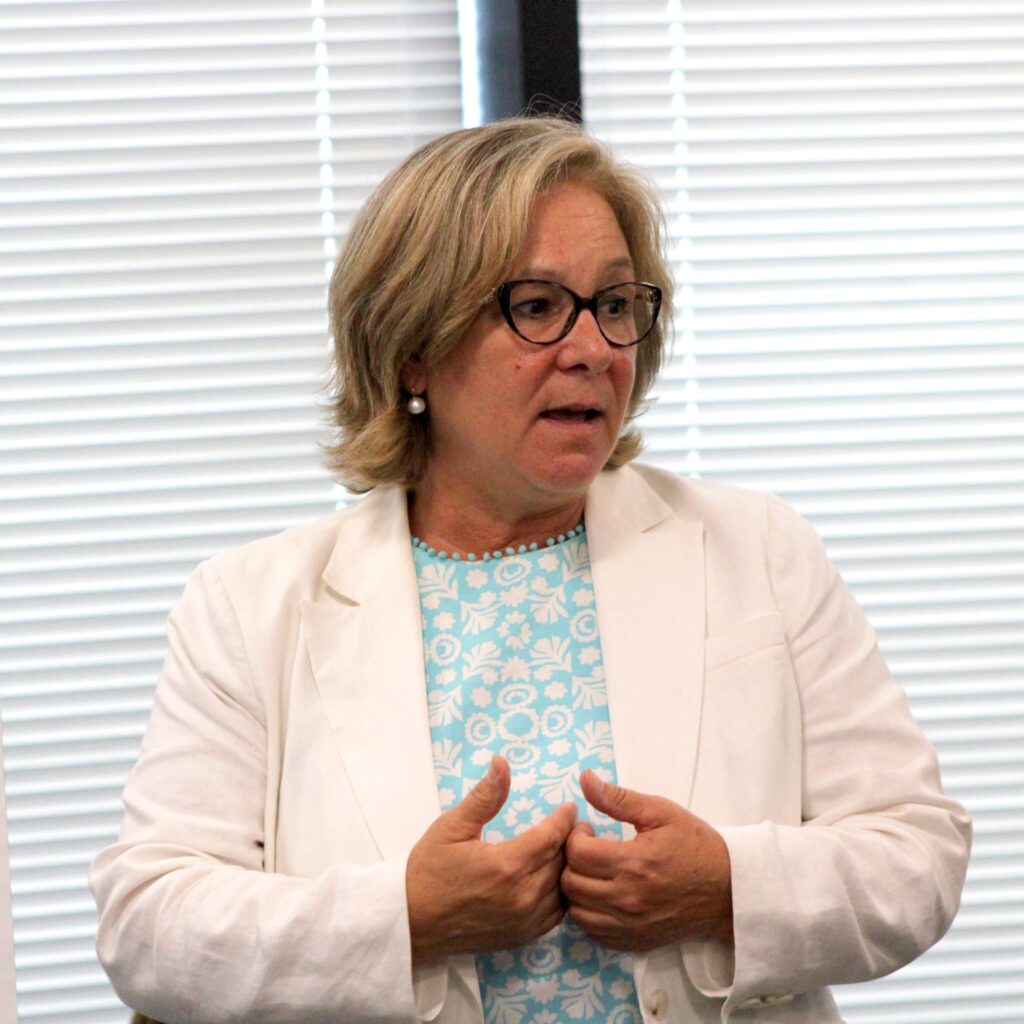
Lois Sicignano Rowman, Esq. (pictured above), of the Law Office of Lois Rowman, presented on behalf of the first group, discussing how New York can strengthen support for survivors and communities.
Rowman says that New York’s Person in Need of Supervision (PINS) system does not always function as intended. The PINS system stipulates that any person under eighteen years of age who does not attend school or exhibits dangerous or highly unusual behavior might require supervision.
“When I have clients brought to [family] court on apparent PINS, the judge cannot put the child in place,” said Rowman. “Judges cannot take children away from their parents, even if they’re running away, committing crimes, or using drugs. The judge has no power to put them in placements.”
Rowman says that PINS services could be “beefed up,” and that would help reach “some of the juveniles who are falling through the cracks who have inattentive parents.” Almost all panelists said that parent inattentiveness and frequent school truancy are usual causes of a child or adoelscent’s desire to run away from home, likely becoming entangled in the world of drugs and sex trafficking.
Rowman also says that children with “comorbidities” also prevent State services from working effectively.
“They’re not just trauma victims, they’re also using drugs, or have behavioral and mental health problems,” said Rowman. “You can’t go to a drug counseling program if you can’t sit still and stop screaming. These services for people who have more than one problem just don’t exist.”
Rowman added that “parents are reluctant to report their kids” because parents “don’t want their children taken away from them,” advocating for more comprehensive services that assuage those fears while also helping the child in question.
Rowman also says that while the State Legislature has allocated money for mental health initiatives, the wait list is “tremendous.”
“We need more providers and we need more money for more programs so people can get services when they need them, not in three months when their crisis is over, or they wind up in crisis for months on end, or the crisis never ends.”
Rowman also says that reaching children at younger ages is crucial in curbing their likelihood of being trafficked, adding that children are trafficked most commonly between the ages of twelve and fourteen.
“We need to reach them in an age-appropriate way in the elementary schools, the Girl Scouts, Boy Scouts, community groups, and churches,” said Rowman. “They think they understand what the world is all about, but they don’t. They’re children.”
Rowman also says that while child sex trafficking is a problem, there’s no “legal mechanism to hold those minors.”
“There’s no place to go. The housing situation is so bad that victims can’t find any apartments,” said Rowman. She added an anecdote of a client who left a homeless shelter and was able to sleep on a friend’s couch. A letter for housing requires someone to confirm that the client is homeless, but if the client is on a couch, then she’s technically not homeless in the eyes of the State.”
“It’s a catch-twenty-two,” said Rowman.
Rowman also called for more caseworkers, better courtroom logistics, and a dedicated human trafficking court.
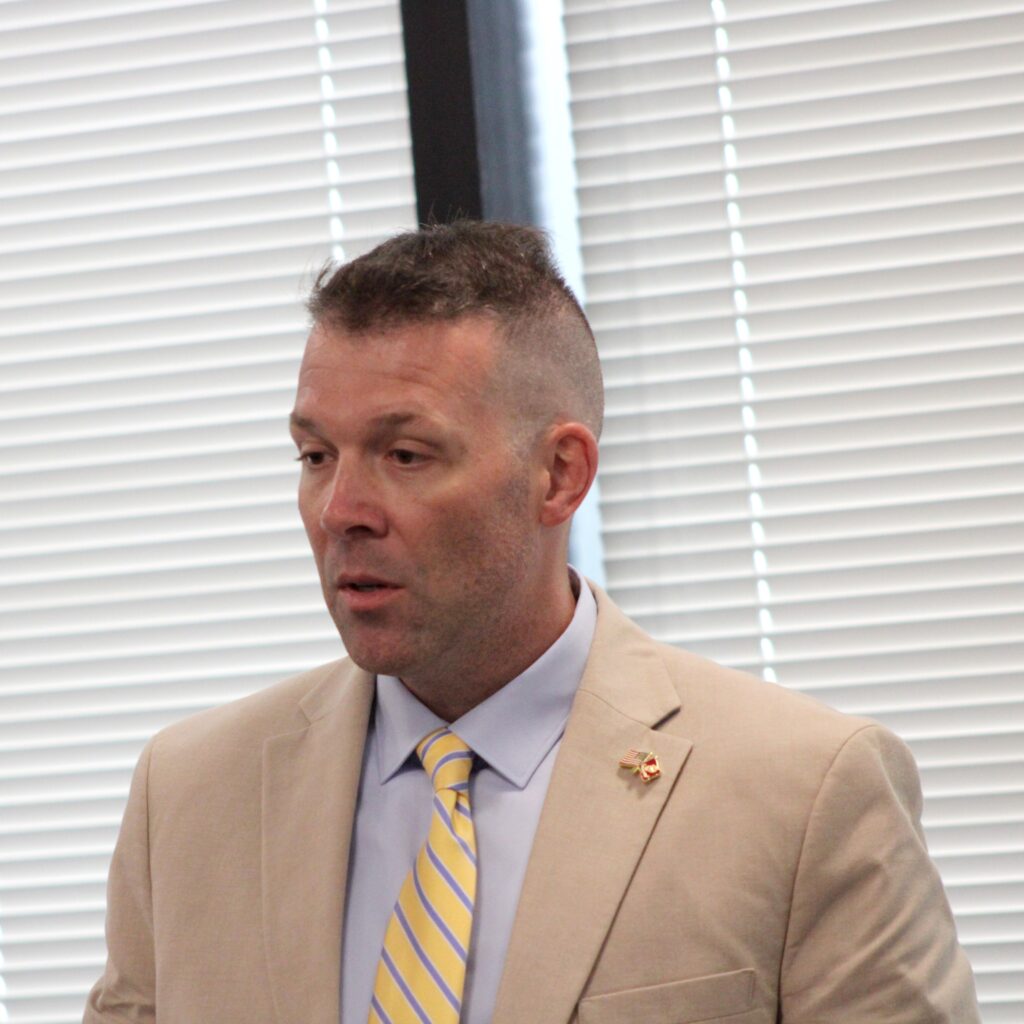
Legislator Lennon (pictured above) and Assemblyman Flood presented on behalf of the second group, discussing coordination and tools that law enforcement and prosecutors need to better combat traffickers.
Lennon said that hotels and motels that are complicit could be handled by abolishing hourly rates, requiring digital recordkeeping of guests, requiring photos IDs, and instituting security cameras. He also mentioned fly-by-night massage parlors and that their landlords should be held accountable for “allowing them to come in and turning a blind eye.”
Assemblyman Flood suggested giving family courts discretion to be able to remand youth victims under terms of mental health issues rather than criminalization.
“It’s a big ask in Albany and not an easy thing, but I think that’s a step in the right direction of recognizing that it’s not about criminalizing these children, but taking them out of those situations,” said Flood, adding that treating the endangered youth as criminals puts them back on the street to return to their “pimps and getting back on drugs.”
Increased statute of limitations on sex trafficking offenses as well as dedicated funding for human trafficking investigations were also suggested.
“Suffolk County has their own dedicated trafficking unit, of which there are not many in the state,” said Flood. “They can funnel information to the police department and the District Attorney’s office and they can all provide those wraparound services.”
Flood suggested Suffolk could be used as the “model” to other agencies and to allocate funds to make it a universal practice statewide.
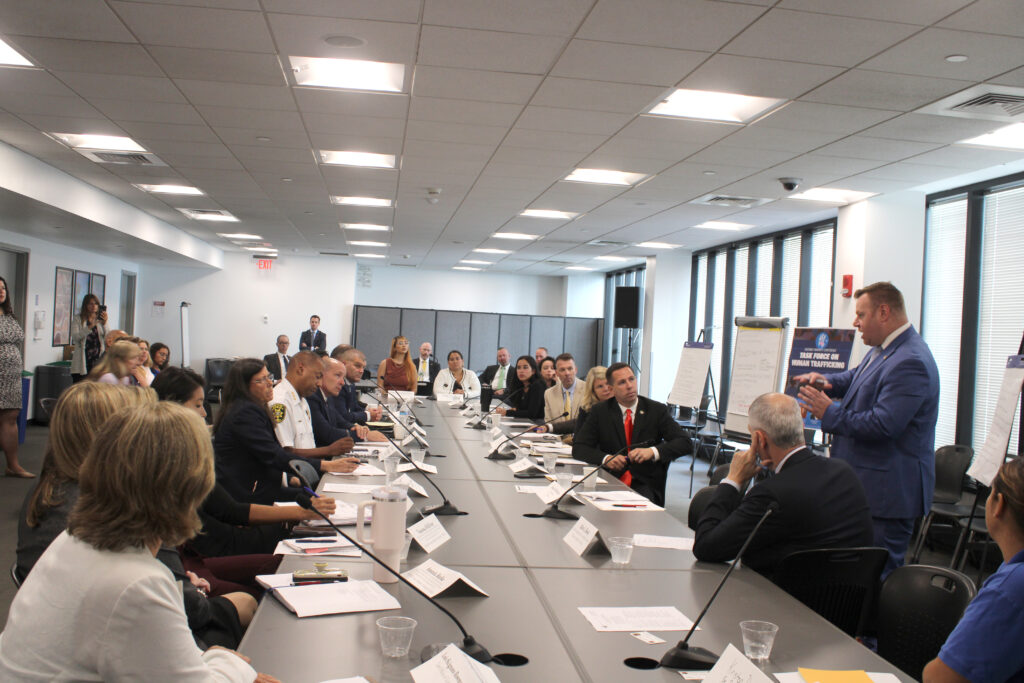
Feride Castillo (pictured below), co-founder of ECLI-VIBES, a non-profit serving victims of domestic violence, child abuse, sexual assault, and human trafficking, presented on behalf of the third group, which discussed how the migrant crisis is affecting the human trafficking trade.
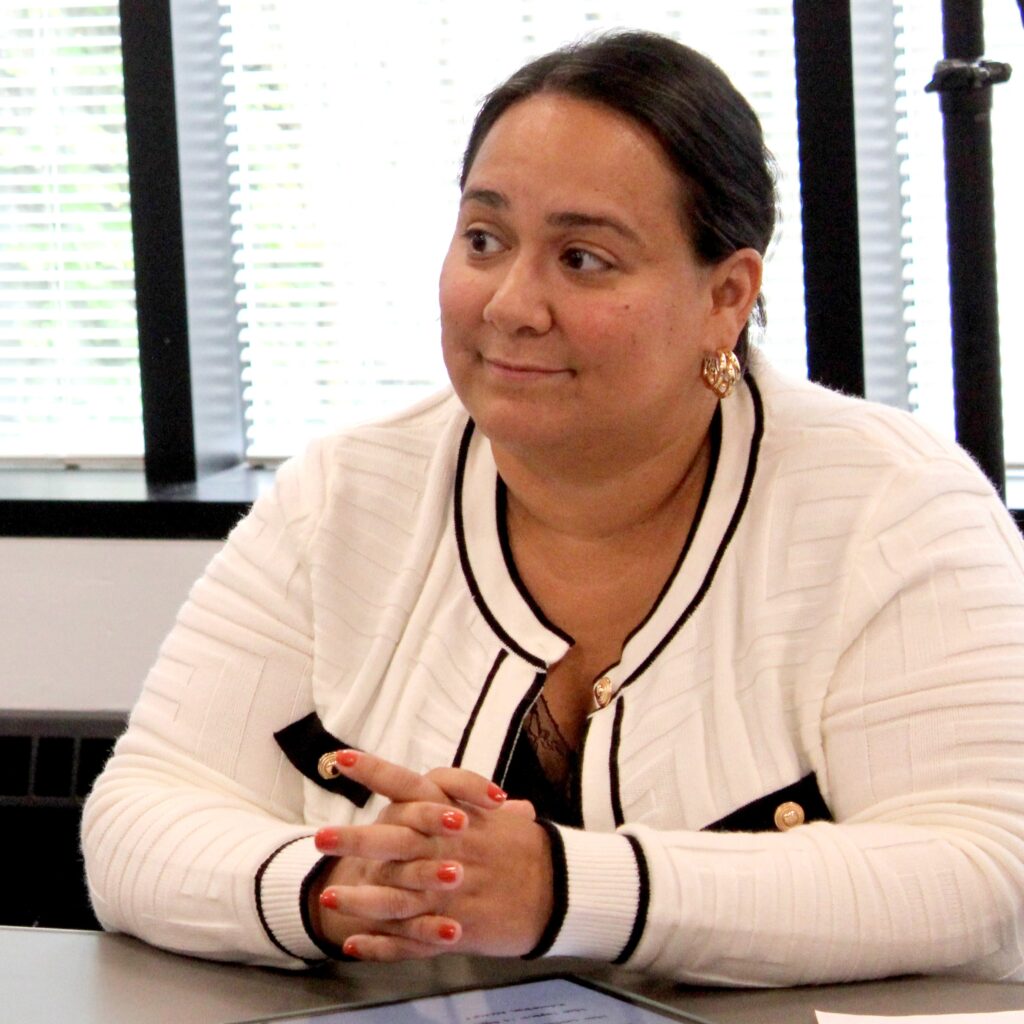
Castillo said that trafficking is perpe-tuated through family members, extended family members, or people pretending to be family members of children. She also says that people in foreign countries are “actually selling some of their children here to those so-called sponsors,” adding that the sponsors end up having relationships with the children as if they were adults.
Castillo also says that migrant children are forced to work and are not allowed to go to school, combining elements of sex and labor trafficking. She adds that part of ECLI-VIBES’ mission is to build trust among the children, but it takes “months.”
“We have to build trust, we need to build a relationship, and unless what we can offer is better than what the crowd is offering, there’s not much that we can do,” said Castillo.
Castillo pleaded with present lawmakers to not “pass legislation without funding,” citing bail reform’s 2019 passage that was unaccompanied by services and funding trickling down to the local level.
Castillo said that her firm is “overwhelmed” with about 5,000 people per month requesting services. She also said that the “brilliant staff” within the Suffolk County Health Department are facing the same problem.
“It’s like a mountain that everybody has to climb every day,” said Castillo, adding that some people are living in their cars.
“If we’re not offering something better than what the traffickers are offering, there’s nothing that we can do,” she added.
Castillo also says that migrant children are connected to family members in parts of Suffolk County, such as Riverhead, Central Islip, and Brentwood, where schools are being “inundated.”
“Two years ago, the registration for unaccompanied minors just in Riverhead was between three and four hundred,” said Castillo, adding that the mandate was “completely unfunded.”
Assemblywoman Giglio (pictured below), a Riverhead resident, stated that her children who attended school there just two years ago were in classes where 65% of the children did not speak English.
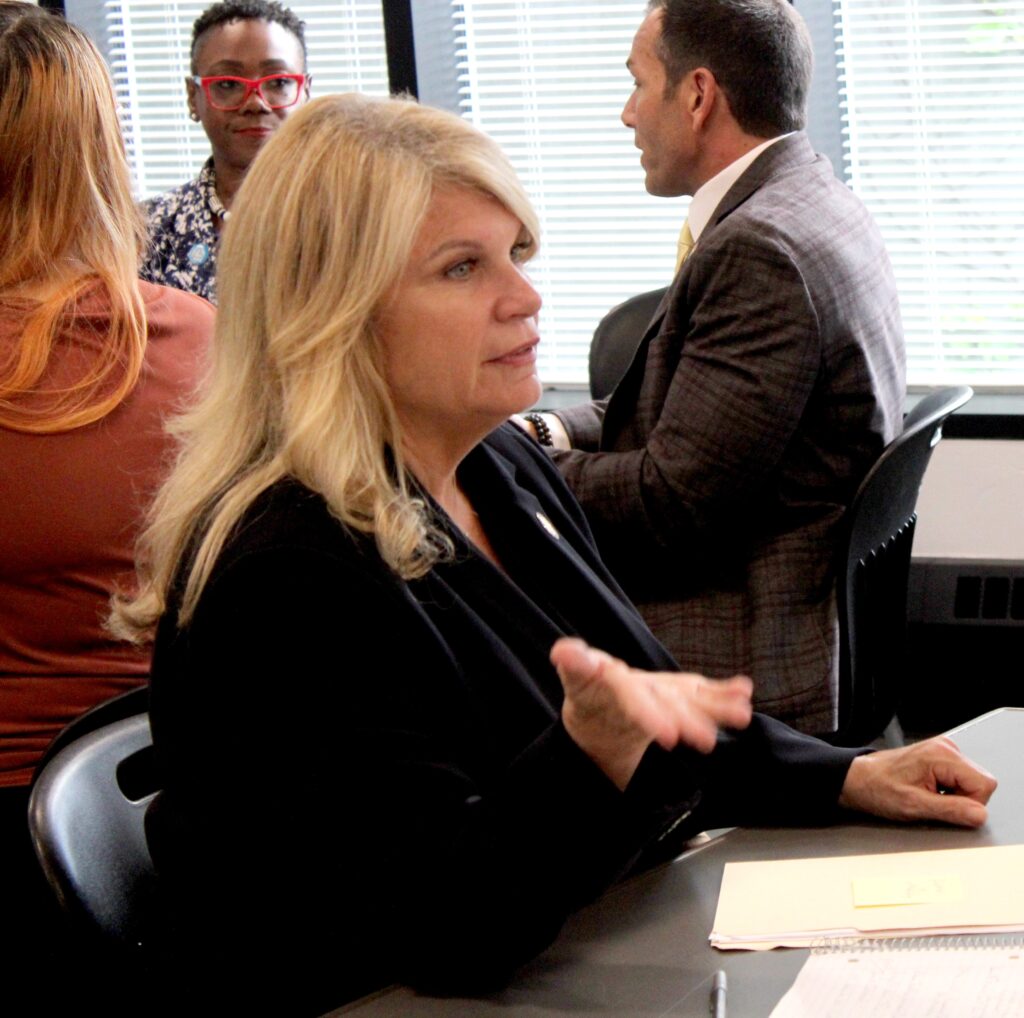
When asked if ECLI-VIBES knows of how many children go missing after crossing the border, she countered: “How would we even know that they’re missing?”
“There is no communication between the federal, state, and local governments. We don’t get the information,” said Castillo, adding that when children do eventually find their family members, there might be forms of resentment and instability, prompting them to find a family of their own.
“If a child only speaks Spanish, doesn’t have a community, doesn’t have a sense of family, what’s a great sense of family? A gang,” said Castillo.
Castillo also said that her organization “can’t even break through into the Hispanic community” as it relates to border crossings because of lack of services. Recent statistics show an increase in Uzbek, Afghan, and Chinese immigrants, who also suffer from lack of services because of larger language barriers.
“We’re doing even less for the others and that is a travesty in general, because we’re not touching those communities at all,” said Castillo.
Laura Ahearn, Esq., LMSW, Executive Director for the Crime Victims Center, said that gangs are “following families to Long Island.”
“The gangs are controlling young girls from far away with their representatives here, and they have the resources to find these people,” said Ahearn, referencing people who escape gang activity in their home countries.
Assemblyman Durso (pictured below) represented the fourth group, discussing education and training to better equip professionals and all New Yorkers alike to better recognize the signs of trafficking.
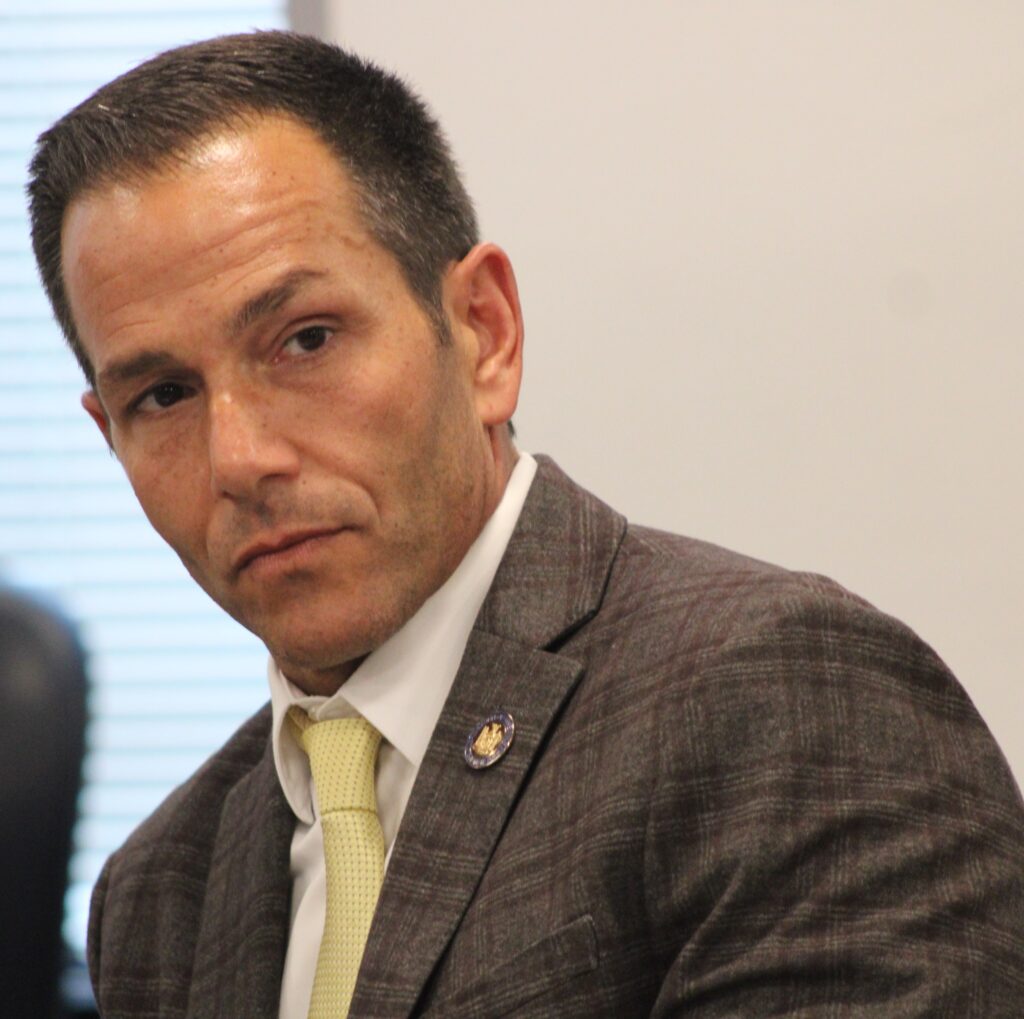
Durso said that while action movies highlight a more obvious forms of trafficking, the reality is trafficking can take root in more innocuous ways, most notably in the form of social media and self-esteem issues.
“It’s just an app one of their friends downloaded and now someone is looking at their information or our family’s information,” said Durso. He added that reporting is also a problem, as some people might be “uncomfortable” talking with law enforcement or the D.A.’s office.
Durso recommends that trafficking survivors campaign to educate the public on the crisis and discuss their experiences.
“We have the Survivor’s Council, which is people that have been trafficked becoming a teacher with lived experiences,” said Durso.
Panelists also mentioned growing problems with video games and Artificial Intelligence, where users can be assaulted virtually or displayed in doctored footage, photographs, or audio clips with the help of AI.
Assemblyman Maher hopes to bring the task force across the state and convene with panels within the different localities.







